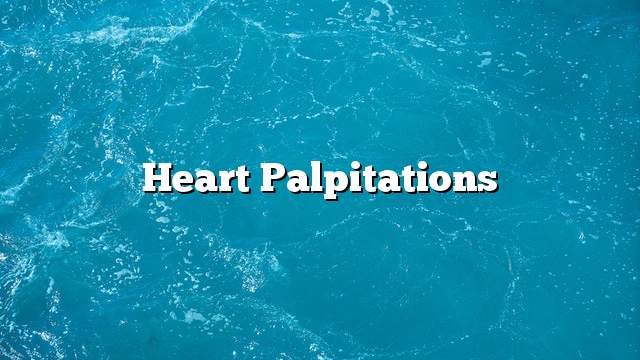Heart palpitations
The heart performs its normal function of pumping blood throughout the body on a daily basis through a precise system created by God in our bodies from the early hours of birth until the last moment in our lives, and the heart beats in the normal person usually at a rate of 70-100 strokes per minute in Comfort mode, but these strikes may vary from person to person depending on the physical effort. If a person is an athlete, the heart rate may drop to 60 strokes per minute.
Heart rate increases to about 100-150 strokes in the case of doing sports, for example, doing hard work or exposure to severe psychological pressure such as trauma or excessive nerve, so that the increase is temporary and ends with the disappearance of the effect, but when the number of heart beats more than 100 beats per minute Rest mode means that the person has a heart rhythm disorder or what is known as heart palpitations.
Causes of heart palpitations
- Such as coronary artery disease, myocardial infarction or dysfunction, arterial hypertension, congenital heart defects, heart valve problems, myocardial infarction, and other diseases.
- • Preserving some medical drugs with side effects.
- Take some stimulants such as alcohol or caffeine such as coffee, tea, and nicotine.
- There is an imbalance in the electrical balance.
- Thyroid disorders “increased gland activity”.
- Do a heart operation.
- Other problems such as carotid ulcers or hypoxia.
- Anemia, especially iron deficiency and vitamin B12.
- Hormonal changes in women during the menstrual cycle or when they break down in menopause or during pregnancy, all of which are temporary and not satisfactory.
- Decreased blood sugar level or lower blood pressure than normal.
- High body temperature “fever”.
- Dry body fluids; excessive sweating, fasting, drinking water, or diarrhea.
- Eat fatty foods, junk foods or spices.
- Exposure to severe nervous stress or stress.
- Long sleeplessness and lack of adequate sleep hours or work at night shifts.
Symptoms associated with heart palpitations
- Shortness of breath or difficulty in self.
- Dizziness or vertigo.
- Excessive sweating.
- Great pressure on the neck or chest area is a “sense of suffocation”.
- General fatigue and fatigue without physical exertion.
- pallor.
- Some cases of fainting sometimes.
